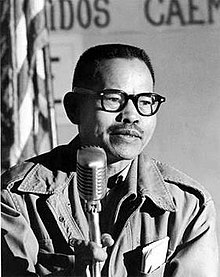Larry Itliong
| Larry Dulay Itliong | |
|---|---|
 |
|
| Born | 25 October 1913 San Nicolas, Pangasinan,Philippine Islands |
| Died | 8 February 1977 (aged 63), disputed Delano, California, United States |
| Cause of death | Lou Gehrig's disease |
| Resting place | North Kern Cemetery, Delano, California |
| Nationality | American |
| Other names | Seven Fingers |
| Occupation | Labor organizer, farmworker |
Larry Dulay Itliong (25 October 1913 – 8 February 1977), also known as "Seven Fingers", was a Filipino American labor organizer. He organized West Coast agricultural workers starting in the 1930s, and rose to national prominence in 1965, when he, Philip Vera Cruz, Benjamin Gines and Pete Velasco, walked off the farms of area table-grape growers, demanding wages equal to the federal minimum wage, that became known as the Delano grape strike. He has been described as "one of the fathers of the West Coast labor movement."
Itliong was a native of Pangasinan Province in the Philippines. One of six children of Artemio and Francesca Itliong, Itliong only had a sixth grade education. He immigrated to the United States in 1929 and joined his first strike in 1930; Itliong was only 14 when he came to the United States. Itliong was an excellent card player, and avid cigar smoker, who spoke multiple Filipino languages, Spanish, Cantonese, Japanese, and taught himself about law. Itliong married six times, had seven children, and raised his family in the Delano area and in the Little Manila community of
As a farmworker Itliong worked in Alaska, where he organized cannery and agricultural unions, Washington, and up and down California; he also worked in Montana and South Dakota. While living in Alaska, he helped found the Alaska Cannery Workers Union (which later became Local 7 of the United Cannery and Packing and Allied Workers Union, then Local 7 of the International Longshoreman's and Warehouse Workers Union). He lost three fingers in an accident in an Alaskan cannery, which earned him the nickname, "Seven Fingers."
Some of the labor organizers whom Itliong met in his early days had ties to the Communist Party. Filipinos in California lead the way in unionization efforts among farmworkers in the 1930s and 40s. During World War II, Itliong served on a U.S. Army transport ship as a messman. After the war, he settled in the city of Stockton in California's Central Valley. In 1948, Itliong (along with Rudy Delvo, Chris Mensalvas, Philip Vera Cruz, and Ernesto Mangaoang) became involved in the 1948 asparagus strike, which was the first major agriculture strike after World War II. Itliong served as the first shop steward of International Longshore and Warehouse Union Local 37, in Seattle, and was elected its vice-president in 1953. He served as secretary of the Filipino Community of Stockton from 1954 to 1956. In 1956, Itliong founded the Filipino Farm Labor Union in Stockton. In 1957, he was elected president of the Filipino Voters League in Stockton. By 1965, Itliong was leading the AFL–CIO union Agricultural Workers Organizing Committee; the majority of members of the committee were Filipinos who had in the 1930s arrived in the United States.
...
Wikipedia
